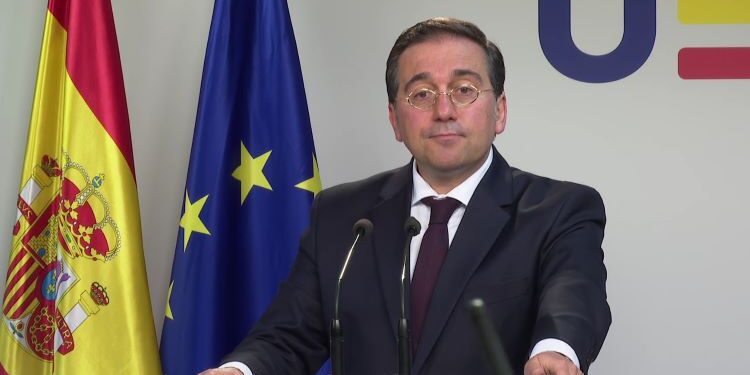Eduardo González
The Minister of Foreign Affairs, José Manuel Albares, yesterday asked the High Representative for EU Foreign and Security Policy, Josep Borrell, to establish a list of “the measures that the European Union could apply” against Israel for non-compliance. of the resolution of the International Court of Justice (ICJ) following the latest Israeli military attack against a displaced persons camp in Rafah, which caused the death of at least 35 people.
“Spain has once again strongly defended the need to reach a definitive peace solution for the Middle East that involves, first of all, the protection of the two-state solution by recognizing the State of Palestine, as it will do tomorrow (today) Council of Ministers of Spain,” declared Albares at the press conference after the EU Foreign Affairs Council (FAC), held in Brussels.
“The news that has reached us tonight from Gaza also forces us, as I have done around the table throughout the afternoon, to remember that the resolutions of the International Court of Justice are mandatory and must be complied with,” including stopping “the military offensive in Gaza,” the minister continued, referring to the ruling of the Hague Court last March, in which Israel was urged to adopt “all possible measures” to protect the Palestinian civilian population of the Gaza Strip and to “urgently” guarantee the arrival of humanitarian aid to the region.
The orders of the ICJ (the oldest court in the UN) are mandatory and its rulings are legally binding for all UN member states, but the Hague Court lacks its own tools to enforce them, as has been stated. could verify orders to Russia to end the invasion of Ukraine.
“I have also indicated,” Albares continued yesterday, “that, if this is not done, the EU must look at what instruments we have at our disposal to support international legality, to support the International Court of Justice and to achieve compliance.” of their sentences and their precautionary measures.”
In this sense, as specified, Albares asked Borrell during the FAC meeting “to establish a list of what measures the EU could apply for this and what has been done in similar circumstances, when there has been a flagrant violation of International Law, by the EU.” “But, first of all, what there is is a call for compliance, and we have also all agreed on this, of those ICJ rulings, and what I hope is that Israel complies with them,” he added. “Of course, Spain, bilaterally and in its corresponding part within the EU, will continue to support this work of the Court and demand that its resolutions be complied with,” he warned. “Spain is committed to multilateralism, much more so when it comes to an institution, such as the ICJ, which is a fundamental and founding body of the United Nations Charter,” he added.
In the FAC last February (before the ICJ ruling), Albares asked Borrell to present in the March Council an evaluation on the “possible non-compliance with International Humanitarian Law by Israel based on the Association Agreement EU-Israel.”
Yesterday’s FAC was attended by the foreign ministers of Saudi Arabia, Jordan, Egypt, the United Arab Emirates and Qatar and the secretary general of the League of Arab States. “We have exchanged with them the best way to join forces so that this two-state solution is viable, so that there is a realistic and viable Palestinian State and so that the State of Israel also has the legitimate security guarantees to which it aspires,” Albares indicated.
According to the minister, “the recognition that Spain will make tomorrow (today) of the Palestinian State” has, among its objectives, to help strengthen the Palestinian Authority, “which is Europe’s partner for our cooperation and, of course, the Palestinian partner for peace”, and that, like the UN agency for Palestinian refugees (UNRWA), it is “absolutely essential” to “facilitate, as soon as possible, access to Gaza for humanitarian aid that is fundamental in this situation of unprecedented humanitarian catastrophe.”







